Garmin Vivosmart 5 Review: Great Fitness Tracking, But Missing Two Big Features
Garmin’s $150 Vivosmart 5 is deceptively simple. It looks like a run-of-the-mill tracker on the outside but packs many health and fitness features from Garmin’s more expensive watches in a lightweight band. There’s blood oxygen, 24/7 heart-rate monitoring, sleep tracking and the body battery score, a way to determine your energy levels. You can wear it for almost a week before needing to charge and there’s enough sports modes to satisfy most casual athletes.
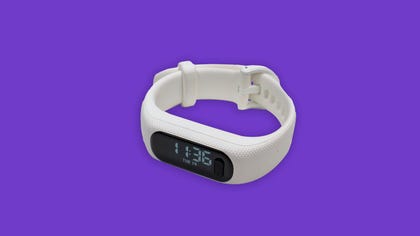
7.8
Garmin Vivosmart 5
Like
- Comfortable, slim design
- Great fitness and energy monitoring tools
- Android and iOS compatible
- Battery lasts almost a week in ideal conditions
Don’t Like
- Connected GPS only
- Monochrome screen
- No always-on display option
- Notifications and workout stats may be too small to read easily
But the Vivosmart 5 doesn’t come with as many hardware features as other popular trackers, and as a result it feels a little too expensive for what it does. It has a monochrome screen instead of a color display, it doesn’t have built-in GPS that works independently of your phone, and there’s no heart-health tools like an electrocardiogram (ECG) such as that found on the $150 Fitbit Charge 5. Still, if you don’t need these tools, the Vivosmart 5 is a good little tracker that’s compatible with Android and iOS.
Easy to use, but the screen falls behind the competition
There’s not much to talk about with the Vivosmart 5’s design. The monochrome touchscreen comes with a single button that either takes you to the main menu or acts as a back button to get to the watch face. The display can get bright enough to see easily during an outdoor workout and has an auto-brightness sensor, though the cover on the screen is pretty reflective. Overall the screen might be a little too small for some to read text notifications and stats during your workout without squinting, even if it is significantly larger than the screen on the older Vivosmart 4.?
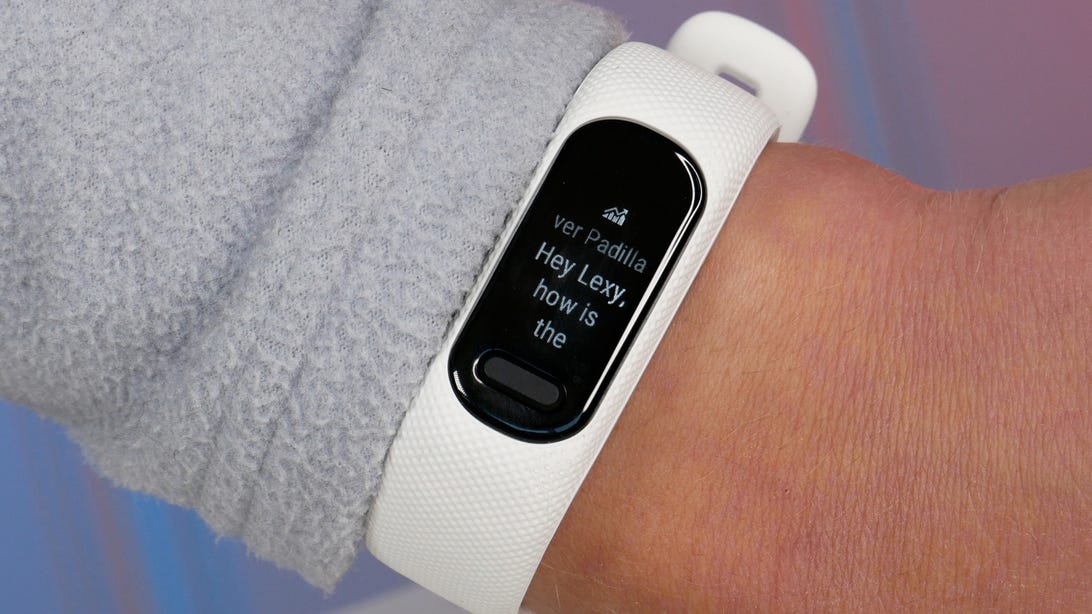
Notification text on the screen may be too small for some to read easily.
Lexy Savvides/CNET
Unfortunately there isn’t a way to increase the text size, but at least all of the key metrics like heart rate, steps and blood oxygen levels are big, which helps with legibility. You can change the watch face to a couple different preloaded options, but there’s no always-on display like the Fitbit. This means you’ll need to raise your wrist or press the button to see workout metrics or the time. Given the battery doesn’t last that much longer than its color-screened cousins, I’m disappointed that Garmin chose to stick to a basic black-and-white screen in 2022.
Even though it looks like a unibody design, you can swap out the entire strap for a different style or material. Just push the tracker out of the band and push it back into a new one. It’s one of the most comfortable fitness trackers I’ve tested, and I hardly notice it when sleeping or working out.
Just enough fitness and health tracking options for most people
The Vivosmart 5 does everything you’d expect. It can track your steps, remind you to move after being still for too long and its heart-rate sensor is active 24/7. There’s also high and low heart-rate alerts, and you can broadcast heart-rate data to third-party apps like Zwift.
Starting an activity is as easy as pressing the button, tapping on the screen to select Activity, then scrolling to find your workout type, but it can also autodetect walks or runs as long as you turn that option on within the Garmin Connect app. There are a couple of workout profiles already preloaded like walking, running and biking, but you can add up to 10 of the 15 available workouts, again using the app. These include activities like stair stepper, HIIT, Pilates, breath work, pool swimming and indoor rowing.
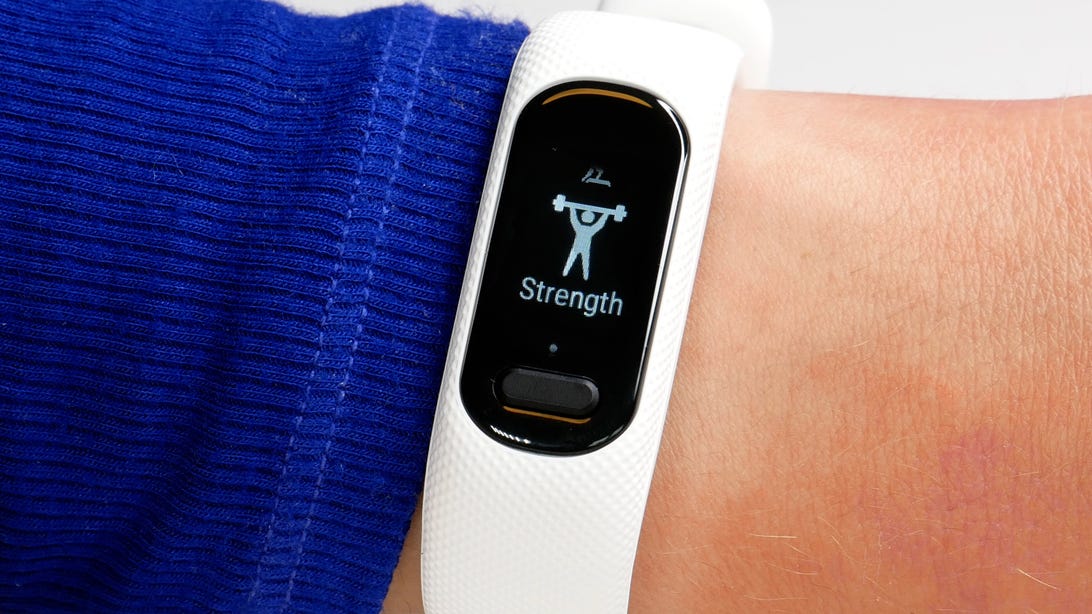
You can choose from 15 different activity tracking types on the Vivosmart 5, but you can only load up to 10 on the band at one time.
Lexy Savvides/CNET
For outdoor activities it has connected GPS, which means you’ll need to take your phone to track distance data on walks, runs and bike rides. It takes up to 10 seconds to lock onto a GPS signal as long as you’re outside with clear visibility of the sky. Sometimes you have to pull out your phone, open the Garmin Connect and wait for it to establish a connection. I experienced a few GPS dropouts during a run and have some more testing to do with the latest update that dropped at review time. Outdoor walks track fine. Also note, there’s no altimeter on board, so elevation data is calculated from your phone.
Heart-rate accuracy during cardio workouts is good when compared to a chest strap, but like other similarly priced trackers, I found the Vivosmart 5 took several minutes to catch up to the strap’s readings over the course of a 25-minute run. Hopefully that can be addressed in a future software update. Resting heart rate is accurate within three beats per minute.
Sleep tracking breaks down the quantity and quality of your rest, with full metrics such as REM and deep sleep in the Garmin Connect app. You can also monitor your blood-oxygen levels all day and overnight, but this does make the battery drain significantly faster. I’m a fan of Garmin’s body battery score, which takes into account heart rate variability, stress levels and activity level to give you an idea of how well your body’s energy levels are doing. This always helps me determine if I have the bandwidth to do a more intense workout, or if I should take it slow.
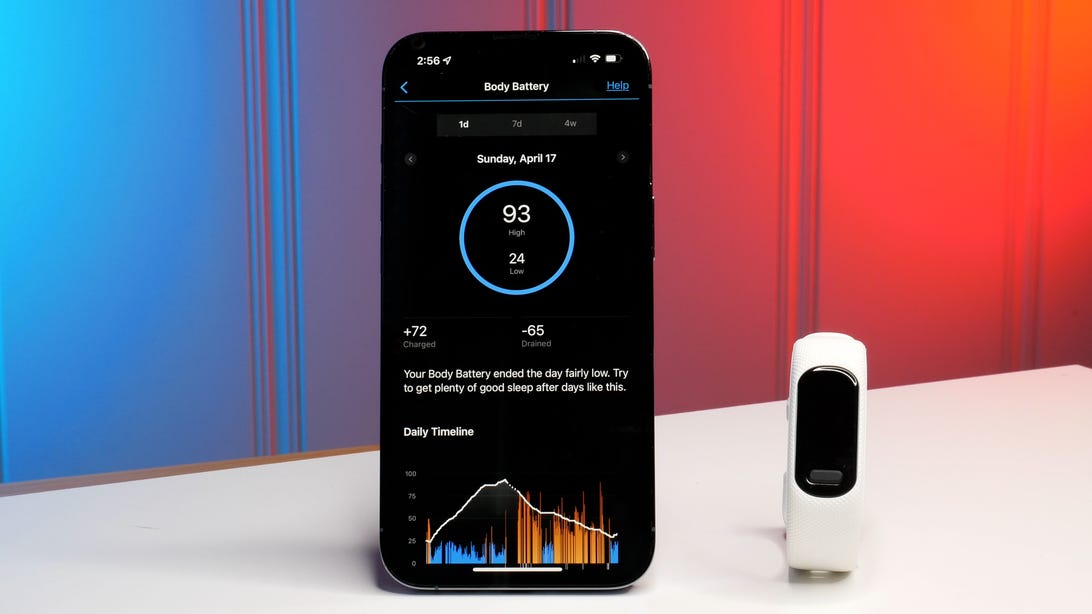
The body battery in action.
Lexy Savvides/CNET
One downside to the Vivosmart 5’s fitness options is that some of the customization needs to be done from the Garmin Connect app, rather than from the tracker itself. Even as someone who’s tested many Garmins, I often get confused about where to find particular options when I’m using the Vivosmart 5. I can see the Garmin Connect app being overwhelming for first-timers, so I recommend spending some time customizing all the widgets to display the metrics and data you need.
Not that many smart features, but battery life is good
Notifications like text messages and call prompts come through just fine on the Vivosmart 5, but sometimes I had to open the app to re-establish the Bluetooth connection. On iOS, you’ll see every single notification that comes through from your phone and unfortunately there’s no way to pick and choose what to push to the band. You also can’t respond to notifications when paired with an iPhone but you can send quick, canned replies if you’re on Android.
The Vivosmart 5 has music controls for whatever music player you have on your phone. I tried playing back from Tidal, Spotify and Apple Music, with the tracker able to control playback from all three. You can also have music controls displayed during a workout, but you’ll need to toggle that option on from the app as it’s not active by default. There aren’t any third-party apps available for the Vivosmart 5, just the default Garmin options that also include a calendar and alarms.
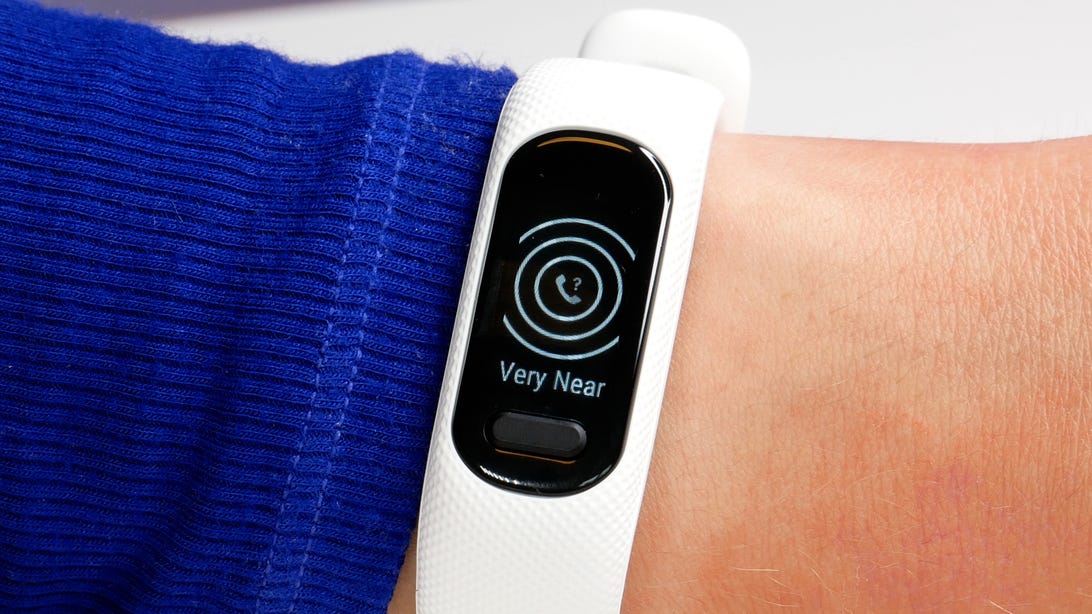
The Vivosmart 5 can ping your phone if you lose it within Bluetooth range.
Lexy Savvides/CNET
Like other Garmin devices, the Vivosmart 5 supports emergency alerts and LiveTrack that shares your location with friends and family during outdoor workouts, as long as your phone is with you. It also has a find-my-phone option.
Battery life is good, as it will last almost a full week between charges if you turn off blood-oxygen tracking and keep the screen brightness at a moderate level. But with a little more heavy usage I managed to get five full days before needing to charge, including a 30- or 60-minute daily GPS workout, sleep tracking and notifications from my phone. I also tracked blood oxygen during one night of sleep, which put a significant dent in the battery life.
Good for fitness fans who need some extra battery life
It really feels a bit outdated to have a fitness tracker that uses a monochrome display in 2022, even if the battery life lasts a little longer than some other trackers. The Fitbit Charge 5 has a bright color display and can last four full days with heavier use, or up to a week with moderate use, while the $47 Mi Band 5 also has a color screen and lasts two weeks if you limit to core features.?
Then again, Garmin doesn’t limit any health metrics behind a paywall, like the $10-a-month Fitbit Premium subscription on the Charge 5. That’s required for deeper insights into sleep data over time and access to the Fitbit daily readiness score, somewhat similar to the body battery on the Vivosmart 5.?
The Vivosmart 5 is three times as expensive as the Mi Band 5, but its heart-rate sensor is more accurate for higher intensity workouts. Get the Vivosmart 5 if you’re looking for comprehensive sleep and fitness tracking, as long as you don’t need built-in GPS or a color display.